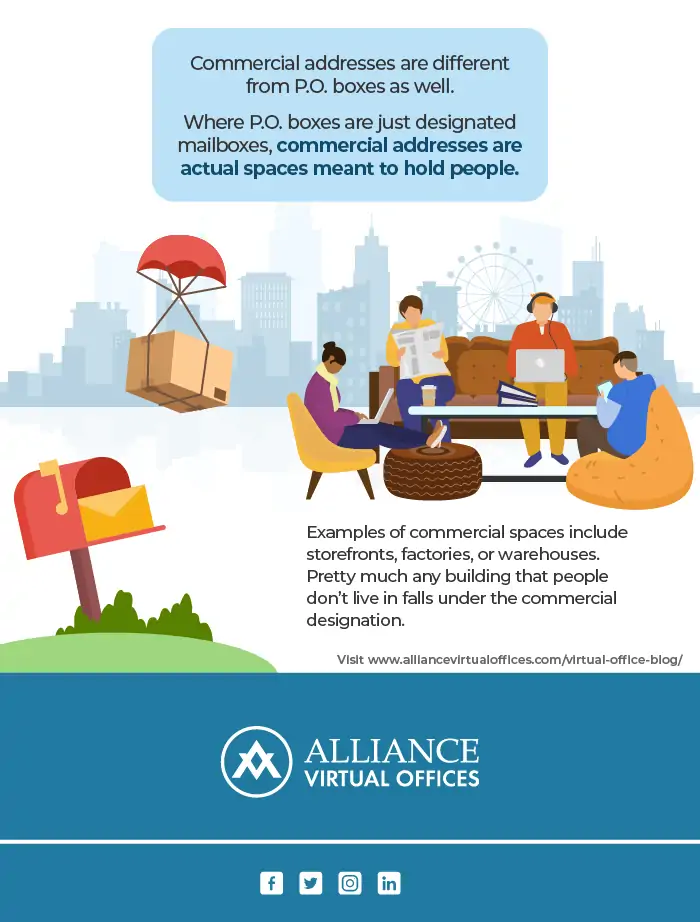- What is a business address?
- What is a registered agent?
- What states allow the business owner to act as registered agent?
Q: Do I need a commercial address to obtain a license for my business?
A: You probably do not need a commercial address for your business license, but it is best to check with the requirements of the state where you plan to organize and run your business.
It’s easy to feel overwhelmed when you’re new to running a business. There are so many logistical components to sort, one of the biggest being your business address.
As if that weren’t already tricky enough, different states have different rules on what constitutes a business address.
While some states allow you to use a virtual address when registering your business, others aren’t so lenient. Many require you to use a commercial address, and some even require you to rent via a registered agent on top of that.
With so much variability between states, it can be maddening trying to figure out what you need to do to register your business.
We’re here to help. We’ve put together this guide to help you quickly identify your state’s regulations about what counts as a business address.
- What is a Commercial Address?
- Do You Need a Commercial Address?
- Using Your Home Address for a Business
- What is a Virtual Office Address?
- States that Allow Virtual Office Addresses
What is a Business Address?
To begin, let’s explain what a business address really is.
On the surface, a business address is simply an address at which a business is located. This is the address where your business likely operates, though as you’ll see in a moment, this doesn’t always have to be the case.
You may be wondering why you need to have a business address in order to register your business. After all, there are hundreds of companies that outsource production and sell entirely online.
The reason you need an address associated with your company is so the government can reach you. The government requires that they be able to communicate with any businesses operating in the US.
Because the primary form of this type of communication is mail, you are required to have an address linked to your company. This ensures you can receive official documents from the government when needed.
The government is stringent on this because an inability to provide important documents to a business can lead to all kinds of legal trouble. For instance, if the company gets involved in a lawsuit, it’s vital they are informed in a timely manner.
An address isn’t the only thing required though.
What is a Registered Agent?
It takes more than just an address to register your business. You’ll also need to have a registered agent before the government gives you their stamp of approval.
A registered agent is a designated representative of a company. They’re responsible for receiving mail and legal documents during regular business hours. If any such communication occurs, they must inform the business owner.
Registered agents also need to live in the state the business is registered in, for obvious reasons.
Because you must have a registered agent if you want to register your business, you can’t use a P.O. box as your business address. While a P.O. box could receive legal documents and mail, they wouldn’t be immediately accessible.
Imagine you registered your business with a P.O. box and you became involved in a lawsuit. You could easily get busy and avoid checking your mail for a week or more.
Not only could this cause problems for the legal system, but it would almost certainly be a big problem for you.
Having a registered agent requirement ensures this kind of thing doesn’t happen. This makes things easier for you and the government.
In many states, the business itself can serve as its own registered agent. That said, not every state allows this.
What States Allow Business Owners to be Their Own Registered Agents?
All states allow business owners to function as their own registered agents if they so choose. That being said, it isn’t always the way business owners choose to handle things.
While being your own registered agent helps keep costs low, it also introduces an additional responsibility for business owners. Should they fail to keep up with any incoming legal documents, this could be disastrous for the business.
In some states, the business itself can serve as its own registered agent. Check your state’s specific guidelines to determine if you can do this with your business.
If you’re in need of a registered agent, we strongly recommend using a designated agency like Anderson Advisors. Their professional registered agents can manage and file your incoming documents and respond to service of process notifications so you can focus on growing your business.
What is a Commercial Address?
A commercial address is an address that designates a commercial building.
Commercial buildings are simply non-residential buildings. In other words, the spaces aren’t for housing. Commercial addresses tend to be in higher population density areas.
Most business addresses are commercial addresses. You can sometimes use a residential address for business registration purposes, but there are a number of downsides to doing so.
We’ll get to those in a bit.
Often, zoning laws and city ordinances also determine what types of businesses, if any, can operate in residential areas.
Commercial addresses are different from P.O. boxes as well. Where P.O. boxes are just designated mailboxes, commercial addresses are actual spaces meant to hold people.
Examples of commercial spaces include storefronts, factories, or warehouses. Pretty much any building that people don’t live in falls under the commercial designation.
Do You Need A Commercial Address?
While the specific requirements for business registration vary state-to-state, generally speaking, you don’t have to have a commercial address to register your business.
You will need a physical address for your business if you are to meet the government’s requirements for registration. As we’ve stated, businesses must have an address listed so they can receive important documents and communications from the government.
Since P.O. boxes are largely not allowed, this leaves two options: residential addresses and commercial addresses.
The address used to register the business must be rented or owned by the business, meaning the only viable residential address is probably the business owner’s home.
What About Home Addresses?
We’ve explained why a business address is necessary for you to register your business. You may be wondering then, why not just use your home address?
Technically you can use your home address to register your business. That being said, business owners almost never do this, and for good reason.
When you register your business, the business address becomes a public record. You’ll wind up sharing where you live with anybody who may be interested if you choose to use your home address.
Using your home address for your business address can result in serious privacy concerns.
Read more: Going Virtual? Make Sure Your Virtual Office is Compliant
This is why most businesses choose not to register at a residential address. Commercial addresses are much preferred, as they can be shared without any fear of invasion of privacy.
Additionally, tying your home address to an LLC registration can cause liability issues. The limited liability element of the LLC only holds if you keep the business separate from your personal affairs.
If you connect your home to the LLC, you may wind up personally liable for any debts or expenses related to the business.
What is a Virtual Office Address?
A virtual office address is an address you can register your business with that is typically in a commercial area and in a physical building.
These spaces work by receiving your mail the same way a P.O. box would. Where they differ though is how you access this mail.
Rather than just sitting there until you decide to stop by and check it, the mail from your virtual address is sent to you. This is typically done through scanning.
Someone at your virtual address receives your mail and legal documents, scans them, then sends them to you electronically. This allows you to use the virtual address as a business address in some instances.
Many times, the person who works at the virtual office can serve as your registered agent as well. Because they are the point of contact and can receive mail during business hours, these people meet the criteria of registered agents in many states.
Depending on your virtual office plan, you can also enjoy additional amenities like meeting room rental, a virtual receptionist service, and coworking benefits.
What States Allow Virtual Business Addresses?
Not all states allow virtual addresses to serve as business addresses. These prohibitions are usually focused around virtual office addresses that list a PO box — or do not include a registered agent service.
Because states are continually updating their requirements for business registration and licensing, it is best to research your state’s specific requirements.
Check this easy guide to learn more about your state’s requirement for the type of business license that is best for your business.
Click here and enter the state where you want to base your business.
The primary concern is that virtual addresses may not facilitate the kind of urgent communications the government may need to make with a business. Even when sent electronically, some state’s feel there may be a delay.
Again, most of these concerns can easily be resolved by using a reputable virtual office company and registered agent service.
Conclusion
While the rules differ between states, it is almost always necessary for a business to register with a commercial address. Even if your state allows it, there are a number of reasons why you shouldn’t use your home address for your business.
Virtual offices provide a great solution for businesses that don’t need physical offices or storefronts. They’re affordable and allow you access to all the important communications and documents you need as a business owner.
Alliance Virtual Offices aims to help you simplify your business registration. Our virtual offices provide the credibility of a commercial address so your business can function however it needs to without the expense of a traditional rental.
Further Reading
- Do You Need a Physical Address for Your Business?
- Business License Requirements By State
- Register Your Business – U.S. Small Business Administration












